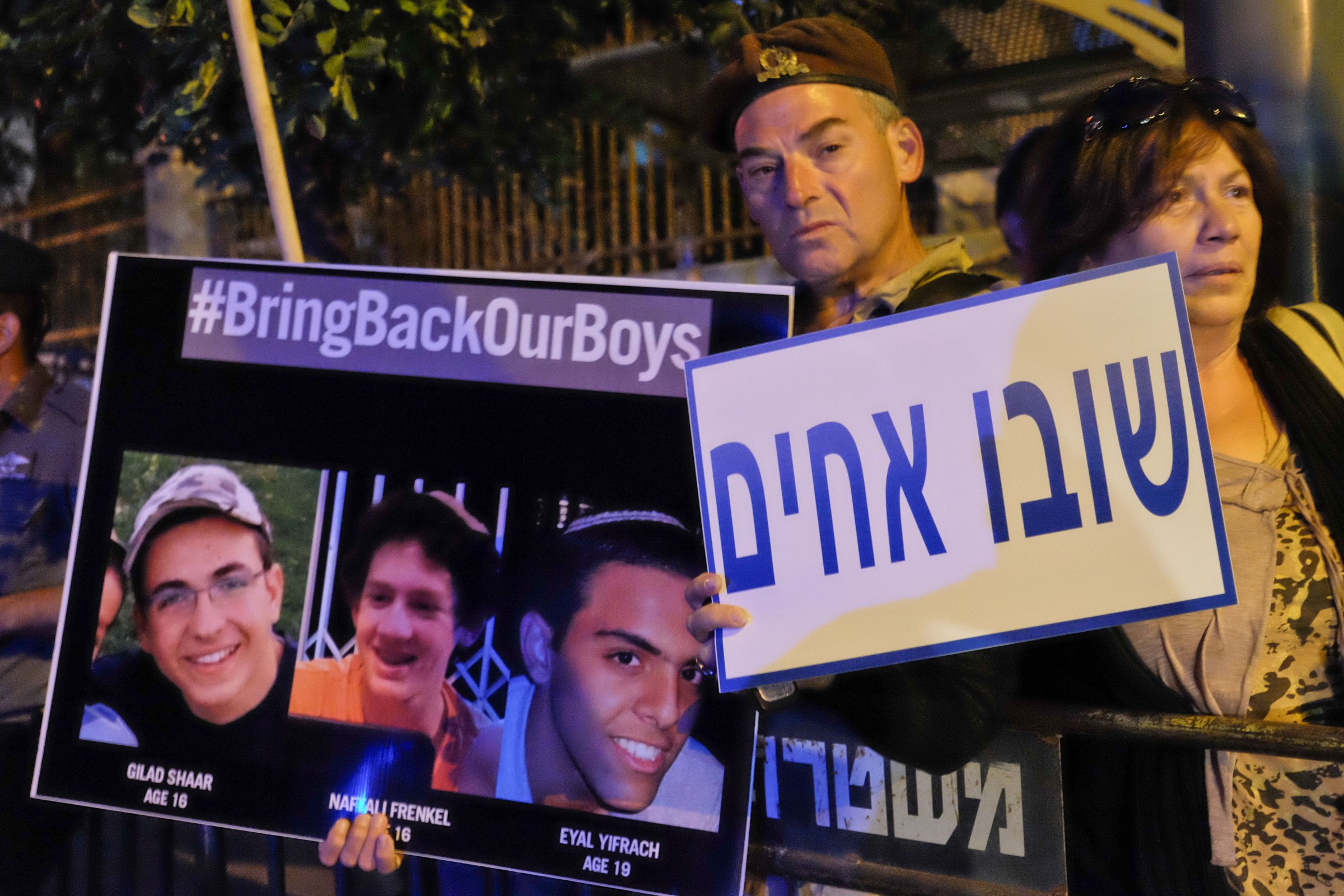
Israel remained galvanized by the kidnapping of three yeshiva students Tuesday, five days after they were apparently taken hostage by Palestinian militants as the teenagers hitchhiked home from West Bank settlements.
No group has taken responsibility for the apparent abduction, but Israeli Prime Minister Benjamin Netanyahu blames Hamas, the militant Islamist party that this month entered into a unity government with Fatah, the secular Palestinian party that controls the West Bank — and which quietly cooperates with Israel to prevent such events.
The timing has tangled the episode in strands of domestic, international and factional politics, including recriminations against Netanyahu, who critics say has encouraged abductions by paying lavishly for the return of previous Israeli captives, including freeing 1,027 Palestinian prisoners from Israeli custody in return for a single soldier, Gilad Shalit, in 2011 after five years in captivity.
But the human drama holds center stage. Israeli media speak of little else beyond Naftali Fraenkel and Gilad Shaar, both 16, and Eyal Yifrach, 19, and the search for them. Tens of thousands gathered at the Western Wall in Jerusalem to pray for their safe return. News programs took on the feeling of a vigil.
“He’s a sweet boy, he’s full of joy and happiness. He’s a fun kid,” Ittael Fraenkel, the aunt of Naftali, who also holds U.S. citizenship, told reporters in a conference call on Monday afternoon. The call was arranged by the Israel Project, a nonprofit that exists to promote Israel, which also circulated downloads about the presumed captives: Eyal performing a song he wrote for a cousin’s wedding, Naftali playing ping-pong. The effort reflected both the public appetite to know more about the youngsters, and presumably an effort to enlist the sympathy of their abductors.
The three were last seen around 10 p.m. on June 12 in a cluster of Jewish settlements south of Jerusalem known as Gush Etzion, where they attended religious school, or yeshiva. Israeli authorities presume they were either lured or forced into a car, and taken south to the vicinity of Hebron, a large Palestinian city that has long been a Hamas stronghold. At 10:25 p.m., one of the youths dialed a police emergency number and whispered, “We’ve been kidnapped,” but the call was at first dismissed as a prank.
When the youths were found to be missing, Israel flooded the area with troops, and began arresting more than 100 Hamas activists. On Monday evening, Netanyahu called for patience, “We are in the middle of a complex operation,” he said. “We need to be prepared for the fact it may take more time.”
Privately, Israelis feared the worst. Though Shalit was held for five years by Hamas, it was in the Gaza Strip, a walled enclave where militants have relative freedom of movement. The West Bank is another story: both Israel’s domestic security agency, Shin Bet, and the security services of the Palestinian Authority maintain elaborate intelligence networks in the territory, with informants likely numbering in the thousands.
And while in this case those intelligence networks failed to detect the plot, paradoxically, they may actually endanger the lives of the captives. In two previous kidnappings of Israelis, the captives were killed shortly after their abduction, out of fear they would be detected. Investigators say kidnappers know how difficult it is to keep a captive secret in the informant-riddled West Bank, and act accordingly, understanding as well that Israel will also trade prisoners for the remains of a hostage. But Israeli authorities on the West Bank in the recent past have also found at least one secret room apparently built to hold more than one captive for a lengthy period of time.
Still, the political toll on Netanyahu was mounting Tuesday. Analysts lambasted him for calling out Palestinian Authority President Mahmoud Abbas, whose security services frequently detain Hamas operatives, and for linking the abduction to tangential political affairs. On Monday night, he said: “I call on those in the international community that condemn us for building in Jerusalem to clearly condemn this kidnapping.”
Critics pointed out that the unity deal with Hamas — which has no ministers in the transitional government — has no evident bearing on the kidnapping plot: Israeli authorities had detected and thwarted scores of plots — which investigators refer to as “bargaining attacks” — before the unity deal was sealed. The more likely variable, the critics point out, is the many prisoners Netanyahu has released in exchange for earlier captives. “As the person who freed … Gilad Shalit, [Netanyahu] cannot deny that he gave terror organizations a serious boost of encouragement to try to abduct additional Israelis, both soldiers and civilians,” columnist Shimon Shiffer wrote in the best-selling daily Yedioth Ahronoth, which is frequently critical of the Prime Minister. “With his own hands, he showed them the road to success.”
— With reporting by Aaron J. Klein / Tel Aviv
More Must-Reads from TIME
- Why Trump’s Message Worked on Latino Men
- What Trump’s Win Could Mean for Housing
- The 100 Must-Read Books of 2024
- Sleep Doctors Share the 1 Tip That’s Changed Their Lives
- Column: Let’s Bring Back Romance
- What It’s Like to Have Long COVID As a Kid
- FX’s Say Nothing Is the Must-Watch Political Thriller of 2024
- Merle Bombardieri Is Helping People Make the Baby Decision
Contact us at letters@time.com